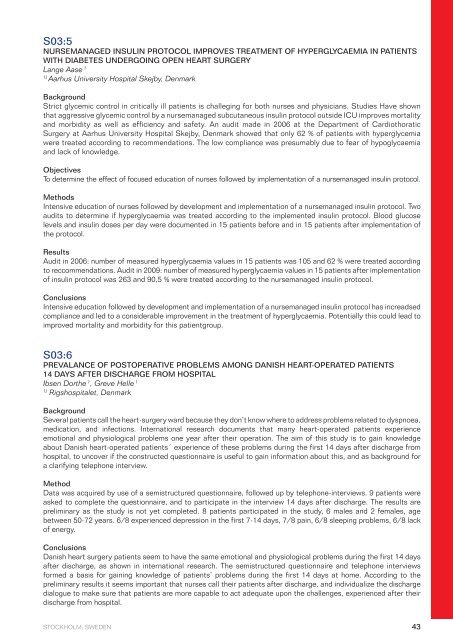SATS 2009 Final Program - Scandinavian Association for Thoracic ...
SATS 2009 Final Program - Scandinavian Association for Thoracic ...
SATS 2009 Final Program - Scandinavian Association for Thoracic ...
Create successful ePaper yourself
Turn your PDF publications into a flip-book with our unique Google optimized e-Paper software.
S03:5<br />
NURSEMANAGED INSULIN PROTOCOL IMPROVES TREATMENT OF HYPERGLYCAEMIA IN PATIENTS<br />
WITH DIABETES UNDERGOING OPEN HEART SURGERY<br />
Lange Aase 1<br />
1) Aarhus University Hospital Skejby, Denmark<br />
Background<br />
Strict glycemic control in critically ill patients is challeging <strong>for</strong> both nurses and physicians. Studies Have shown<br />
that aggressive glycemic control by a nursemanaged subcutaneous insulin protocol outside ICU improves mortality<br />
and morbidity as well as efficiency and safety. An audit made in 2006 at the Department of Cardiothoratic<br />
Surgery at Aarhus University Hospital Skejby, Denmark showed that only 62 % of patients with hyperglycemia<br />
were treated according to recommendations. The low compliance was presumably due to fear of hypoglycaemia<br />
and lack of knowledge.<br />
Objectives<br />
To determine the effect of focused education of nurses followed by implementation of a nursemanaged insulin protocol.<br />
Methods<br />
Intensive education of nurses followed by development and implementation of a nursemanaged insulin protocol. Two<br />
audits to determine if hyperglycaemia was treated according to the implemented insulin protocol. Blood glucose<br />
levels and insulin doses per day were documented in 15 patients be<strong>for</strong>e and in 15 patients after implementation of<br />
the protocol.<br />
Results<br />
Audit in 2006: number of measured hyperglycaemia values in 15 patients was 105 and 62 % were treated according<br />
to reccommendations. Audit in <strong>2009</strong>: number of measured hyperglycaemia values in 15 patients after implementation<br />
of insulin protocol was 263 and 90,5 % were treated according to the nursemanaged insulin protocol.<br />
Conclusions<br />
Intensive education followed by development and implementation of a nursemanaged insulin protocol has increadsed<br />
compliance and led to a considerable improvement in the treatment of hyperglycaemia. Potentially this could lead to<br />
improved mortality and morbidity <strong>for</strong> this patientgroup.<br />
S03:6<br />
PREVALANCE OF POSTOPERATIVE PROBLEMS AMONG DANISH HEART-OPERATED PATIENTS<br />
14 DAYS AFTER DISCHARGE FROM HOSPITAL<br />
Ibsen Dorthe 1 , Greve Helle 1<br />
1) Rigshospitalet, Denmark<br />
Background<br />
Several patients call the heart-surgery ward because they don’t know where to address problems related to dyspnoea,<br />
medication, and infections. International research documents that many heart-operated patients experience<br />
emotional and physiological problems one year after their operation. The aim of this study is to gain knowledge<br />
about Danish heart-operated patients´ experience of these problems during the first 14 days after discharge from<br />
hospital, to uncover if the constructed questionnaire is useful to gain in<strong>for</strong>mation about this, and as background <strong>for</strong><br />
a clarifying telephone interview.<br />
Method<br />
Data was acquired by use of a semistructured questionnaire, followed up by telephone-interviews. 9 patients were<br />
asked to complete the questionnaire, and to participate in the interview 14 days after discharge. The results are<br />
preliminary as the study is not yet completed. 8 patients participated in the study, 6 males and 2 females, age<br />
between 50-72 years. 6/8 experienced depression in the first 7-14 days, 7/8 pain, 6/8 sleeping problems, 6/8 lack<br />
of energy.<br />
Conclusions<br />
Danish heart surgery patients seem to have the same emotional and physiological problems during the first 14 days<br />
after discharge, as shown in international research. The semistructured questionnaire and telephone interviews<br />
<strong>for</strong>med a basis <strong>for</strong> gaining knowledge of patients’ problems during the first 14 days at home. According to the<br />
preliminary results it seems important that nurses call their patients after discharge, and individualize the discharge<br />
dialogue to make sure that patients are more capable to act adequate upon the challenges, experienced after their<br />
discharge from hospital.<br />
STOCKHOLM, SWEDEN 43


